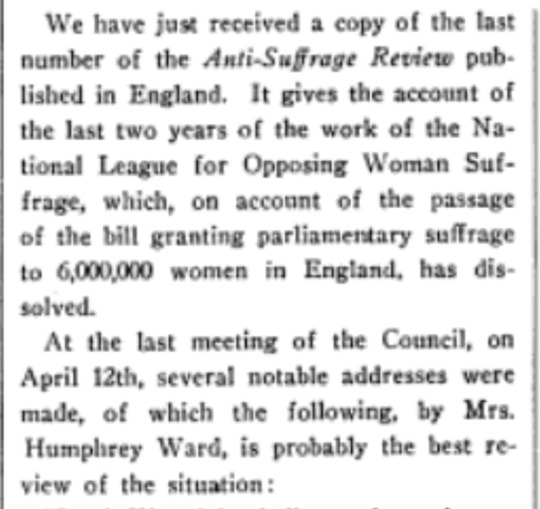#fun fact: Mary Ward was an important figure in opening up educational opportunities to women
Text



“Lord Weardale, ladies and gentlemen, we have come to address you here today, and to take leave of each other at the end of a long fight. In a sense I may look back upon very little short of half a century, because, when the question first came to be debated I was at Oxford, and taking a rather active part in the organization of women's education at Oxford. It was a subject which them frequently came up. We all had to consider it, and, at that time, there was a great difference between Oxford and Cambridge. Cambridge, on the whole, as you know, led the suffrage cause; Oxford, on the whole, with some exceptions, was on the other side. Then for a long time, as we remember, it was an academic question, coming up in Parliament again and again, but never really having any actuality. Then the last active phase seems to me to have lasted about ten years.
It was when I came back from America in 1908 that this League was started, and that we had those striking first meetings which enabled us to appeal with such great success as we did to the country. For ten years we have kept up the fight, and what might have happened if the war, the great convulsion in which we stand, had gone by without a decision in the matter, I do not think can be quite foretold. But the decision of the Speaker's Conference, carried, as Lord Weardale said, by a small majority, made the thing at once actual; and then there was the wave of gratitude towards the women of the country for the work which they had done, which was very natural, very natural indeed. It might, at a time less fraught with excitement and intensity of feeling, have been met and countered by argument, but at the present time it was, as we all know, too strong to resist.
At the same time a considerable fight was really put up. (Hear hear.) In the House of Lords—I may say that having been entrusted with the chairmanship of the Executive I studied that debate certain things struck me very much, and struck me freshly and newly during the course of that debate. Lord Seiborne, in the course of his remarkable speech, which, I think, did more thany anything else to carry the debate in the House of Lords, Lord Seiborne admitted in the strongest possible way that women were deeply divided on this question. He said that. We had a singular proof of it on the very eve of the House of Lords debate. The suffragists sent a memorial to the House of Lords, signed by between 400 and 500 persons engaged in war work. Some of our friends in the House of Lords sent it to us. We felt it necessary to produce a counter move.
In a very few days, during the Christmas holidays, when the office, except for the devotion of Miss Garland, and one or two of her helpers, was practically closed, we sent out a certain number of letters to friends and Branches, and so forth, and within a fortnight, not four or five hundred, but two thousand women engaged in the war work of this country had sent in their names to the office. (Applause.) They were names of the greatest significance. They were the names of women doing some of the most important war work of the country, as well as of the rank and file. There were V.A.D's, nurses and helpers in the camps and cantonments, who, as we know, are indispensable to the great host.
When I showed this list to Lord Lansdowne and Lord Bryce, they both felt that it was a very remarkable thing, and they both said—and I am afraid I agree with them—that if this had been done some time before, it might have made some substantial difference to the whole result. Yes, women were deeply divided, and we were perfectly right to fight the great fight on behalf of those hundreds and thousands of women throughout the country who would have preferred not to take upon themselves the great responsibility of the vote. But now the great responsibility is there, and, as Lady Jersey so eloquently said, we have to go forward in a different scene and under a different sky. But, above all, we have got to hold over us a flag of womanly stead-fastness, womanly help, womanly service to our country, and not regretting her (applause.)”
From “Mrs. Humphry Ward Led Last Stand in England” from The Woman Patriot, June 1, 1918.
A reprint of Mrs. Mary Augusta Ward’s speech at the last meeting of the Women’s National Anti-Suffrage League. Anti-suffragettes outside of the U.S. aren’t really discussed on my blog because I study American history, but the anti-suffrage (and suffrage) movement in the U.K. was closely watched by Americans on both sides of the question. The American antis notably view the loss in Britain as one that happened because of lobbying, and then late action on the part of British antis.
#anti feminism#anti feminist#anti suffrage#the woman patriot#fun fact: Mary Ward was an important figure in opening up educational opportunities to women#just like some of her American counterparts#mary ward
2 notes
·
View notes